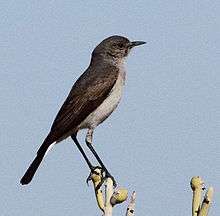Karoo chat
| Karoo chat | |
|---|---|
 | |
| In Northern Cape, South Africa | |
| Scientific classification | |
| Kingdom: | Animalia |
| Phylum: | Chordata |
| Class: | Aves |
| Order: | Passeriformes |
| Family: | Muscicapidae |
| Genus: | Emarginata |
| Species: | E. schlegelii |
| Binomial name | |
| Emarginata schlegelii (Wahlberg, 1855) | |
| Synonyms | |
|
Cercomela schlegelii | |
The Karoo chat (Emarginata schlegelii) is a small passerine bird of the Old World flycatcher family Muscicapidae. It is a common resident breeder in southwesternmost Angola, western Namibia and western South Africa. Its habitat is Karoo and desert scrub in the south, extending to the escarpment zone in the north.
Taxonomy
The first formal description of the Karoo chat was by the Swedish naturalist Johan August Wahlberg in 1855 under the binomial name Erithacus schlegelii.[2][3] The species was subsequently placed in the genus Cercomela introduced by Charles Lucien Bonaparte in 1856.[4] It was moved to its current genus, Emarginata, after molecular phylogenetic studies published in 2010 and 2012 found that Cercomela was polyphyletic.[5][6][7] The specific name commemorates the German ornithologist, Hermann Schlegel.[8]
There are four subspecies:[7]
- E. s. benguellensis (Sclater, WL, 1928) – southwestern Angola and northwestern Namibia
- E. s. schlegelii (Wahlberg, 1855) – coastal Namibia
- E. s. namaquensis (Sclater, WL, 1928) – southern Namibia and northwestern South Africa
- E. s. pollux (Hartlaub, 1866) – western and central South Africa
Description

The Karoo chat is 16–18 cm long and weighs around 32 gm. Its upperparts are grey, but it has a rufous patch behind the eye, and the tail is black with white outer feathers. Its underparts are white, the short straight bill, legs and feet are black and the eye is dark. The sexes are similar, but the juvenile is spotted with buff and has scaly underparts..
This species is paler than the similar grey form of the female mountain wheatear, from which it also differs in having a grey (not white) rump and completely white outer tail feathers. Its larger size and all-white outer tail feathers prevent confusion with the tractrac or sickle-winged chats.
The Karoo chat has "chak-chak" and trrat-trrat calls.
Behaviour
The Karoo chat builds a cup-shaped nest of straw and leaves on the ground, usually under a bush or shrub. It lays two to four green eggs. This species is monogamous, mating for life.
The Karoo chat is usually seen singly or in pairs. It forages from the ground for insects including butterflies, bees, wasps, locusts and ants. Prey is typically taking in a short flight.
Conservation status
This common species has a large range, with an estimated extent of 1,100,000 km². The population size is believed to be large, and the species is not believed to approach the thresholds for the population decline criterion of the IUCN Red List (i.e. declining more than 30% in ten years or three generations). For these reasons, the species is evaluated as Least Concern.[1]
References
- 1 2 BirdLife International (2012). "Emarginata schlegelii". IUCN Red List of Threatened Species. Version 2013.2. International Union for Conservation of Nature. Retrieved 26 November 2013.
- ↑ Mayr, Ernst; Paynter, Raymond A. Jr, eds. (1964). Check-list of Birds of the World. Volume 10. Cambridge, Massachusetts: Museum of Comparative Zoology. p. 100.
- ↑ Wahlberg, Johan August (1855). "Nya fogelarter från Damara-landet i södra Africa". Öfversigt af Kongl. Vetenskaps Akademiens Förhandlingar. 12: 213.
- ↑ Mayr, Ernst; Paynter, Raymond A. Jr, eds. (1964). Check-list of Birds of the World. Volume 10. Cambridge, Massachusetts: Museum of Comparative Zoology. p. 96.
- ↑ Outlaw, R.K.; Voelker, G.; Bowie, R.C.K. (2010). "Shall we chat? Evolutionary relationships in the genus Cercomela (Muscicapidae) and its relation to Oenanthe reveals extensive polyphyly among chats distributed in Africa, India and the Palearctic". Molecular Phylogenetics and Evolution. 55 (1): 284–292. doi:10.1016/j.ympev.2009.09.023.
- ↑ Aliabadian, M.; Kaboli, M.; Förschler, M.I.; Nijman, V.; Chamani, A.; Tillier, A.; Prodon, R.; Pasquet, E.; Ericson, P.G.P.; Zuccon, D. (2012). "Convergent evolution of morphological and ecological traits in the open-habitat chat complex (Aves, Muscicapidae: Saxicolinae)". Molecular Phylogenetics and Evolution. 65 (1): 35–45. doi:10.1016/j.ympev.2012.05.011.
- 1 2 Gill, Frank; Donsker, David (eds.). "Chats, Old World flycatchers". World Bird List Version 7.2. International Ornithologists' Union. Retrieved 3 May 2017.
- ↑ Jobling, James A. (2010). The Helm Dictionary of Scientific Bird Names. London: Christopher Helm. p. 350. ISBN 978-1-4081-2501-4.
- Ian Sinclair, Phil Hockey and Warwick Tarboton, SASOL Birds of Southern Africa (Struik 2002) ISBN 1-86872-721-1
- Birds of Southern Africa
External links
- Karoo chat - Species text in The Atlas of Southern African Birds.
Xeno-canto: audio recordings of the Karoo chat
